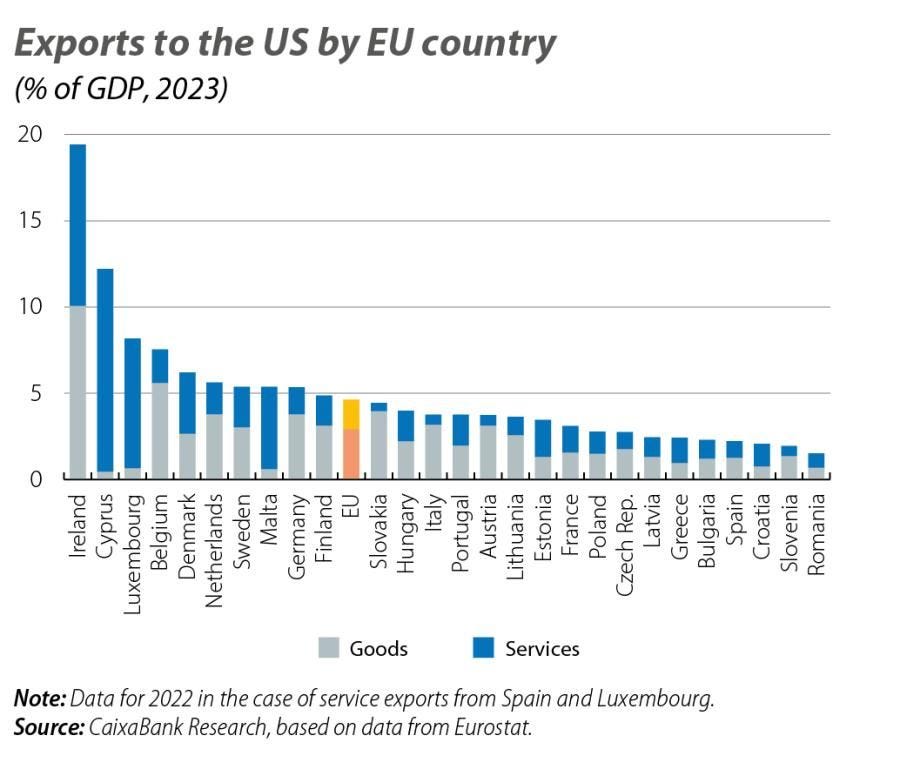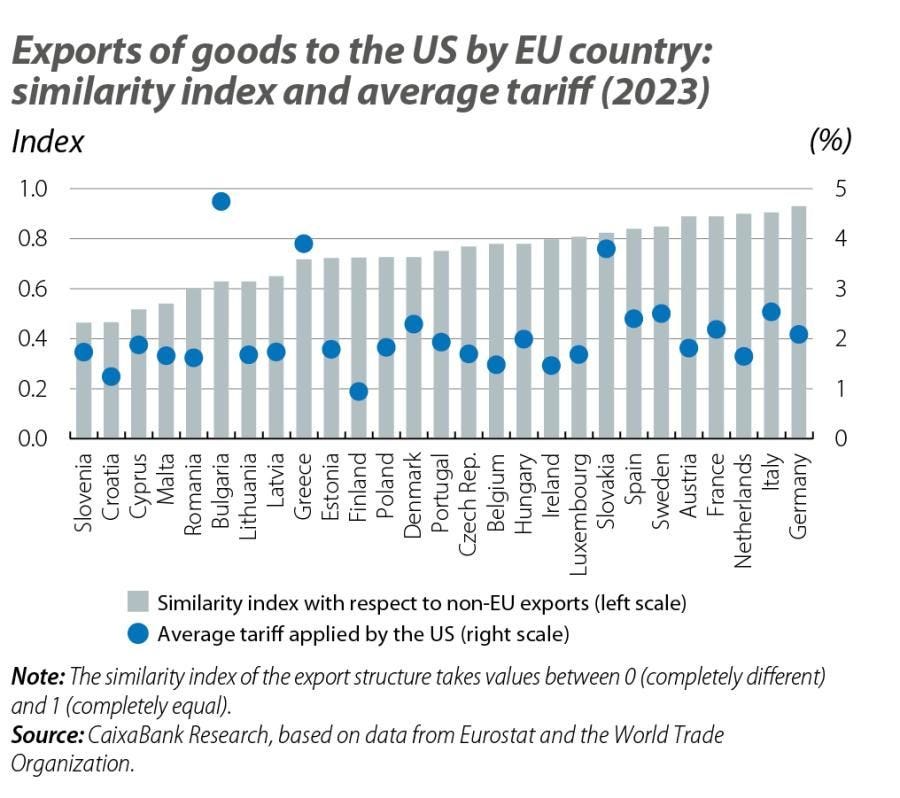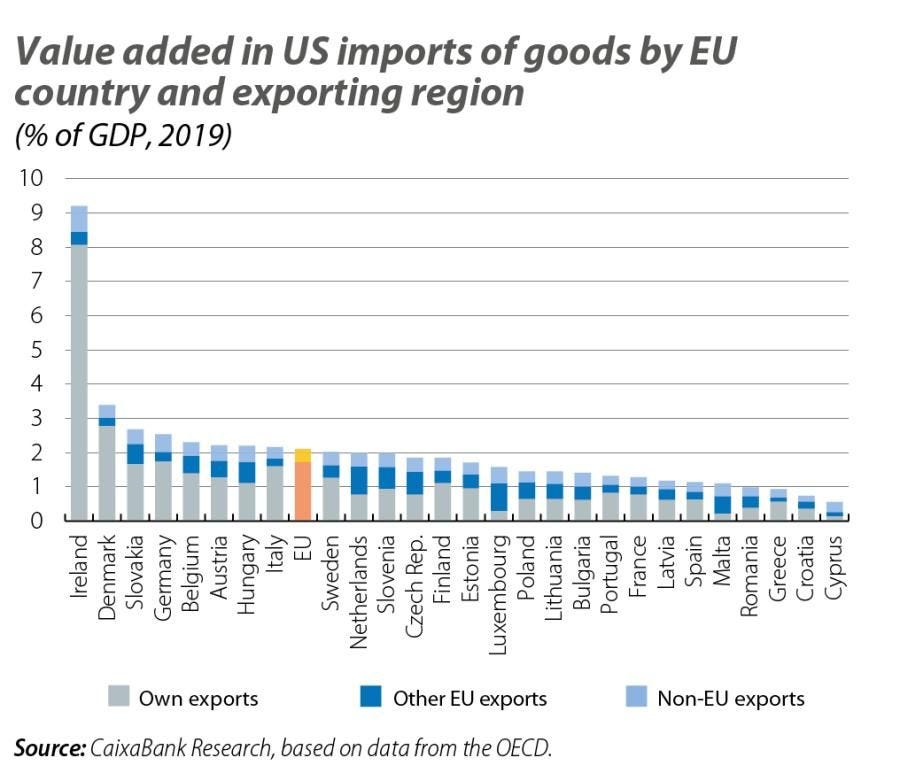EU and Greece after Trump's tariffs?
Assessing the impact of a new US-EU trade war
Welcome to the 23 awesome new readers who joined us in the past week!
If you haven’t subscribed, join 2,982 smart, curious people interested in Changing Greece.
🛃 EU and Greece after Trump's tariffs?

How will President Trump’s proposed tariffs impact Greece and the rest of the EU?
"The European Union is very, very bad to us […] So they're going to be in for tariffs. It's the only way ... you're going to get fairness."
- Donald Trump, President of the United States
The 47th President of the United States has made clear both before and after his inauguration that tariffs are coming and EU will (most likely) not be spared.
The size of the cannonball is yet to be determined, but everyone in Europe is already preparing for a new reality where trade wars are the law of the economic world order.
This has already become a top issue for most Greek media, such as Kathimerini, Proto Thema, To Vima, Capital, Sofokleousin.
Bank of Greece governor Yannis Stournaras recently wrote an opinion piece about the potential impact of US tariffs for Greece and Europe. Key parts are highlighted below:
It is too soon to talk about the exact impact on Greece of the new United States government’s policies, because all we know so far is what was announced before Donald Trump took office. That said, if these announcements are actually implemented, and particularly the matter of imposing tariffs, either horizontally or on a case-by-case basis, this will certainly have negative consequences for the European Union’s economy, and especially for its already sluggish growth.
Our outlook for economic growth in the eurozone in 2025 is 1.1%. Imposing tariffs in the order of 10% would, according to estimates, whittle this by 0.5% in two years. This is a preliminary rough estimate that provides a sense of scale and leaves little doubt that the impact on the EU economy will be quite significant. Naturally, the effects will be more pronounced in countries with substantial exports to the US, particularly industrial goods, and less so in countries, like Greece, which are focused on the production of services.
- Yannis Stournaras, Bank of Greece governor
Stournaras is right. It is still early to size up the full effects of all this. Nevertheless, it is a hassle we should all start getting ready for.
Let’s look at the numbers.
What will be the impact of US tariffs for the EU?
We should begin by understanding the status quo before Trump’s election.
What does the tariff landscape in the US look like today?

With the exception of the 10% of tariffs for imports from China, the rest of the world currently enjoys either very low or non-existent US tariff rates. The world average is around 2%, EU hovers above 1.5% and Canada/Mexico are closer to 0.2%.
What is changing now?
Trump has signaled an intension to impose 60% tariffs on imports from China, 10-25% tariffs on goods from countries like Mexico and Canada and selective tariffs on EU Members States that might divide the bloc.
So what do the experts think will happen?
According to research from LSE, the impact of Trump’s initial tariff proposals would be much more impactful to China and the US itself than the EU.
In another report by Citi, its economist Christian Schulz sees a broad 10% tariff from the U.S. reducing EU GDP by just 0.3% over two years.
We can consider these the “optimistic assessments”.
According to research by Goldman Sachs, the proposed tariffs would be twice as negative for the EU/EZ region than the US, with an impact closer to 1% of GDP.
In fact, a study by BCG sees the EU paying the highest price out of all other regions.
We can consider these the “pessimistic assessments”.
So, what do we make of them?
Well, we are still at speculation land. Nobody really knows what will happen yet.
A lot will depend on how the EU decides to react to Trump’s tariffs — will it be an aggressive comeback, a combination of carrots and sticks, or just complete servitude?
Both ECB President Christine Lagarde and EC President Ursula Von der Leyen are watching carefully. And so are the rest of the European leaders.
How exposed is Greece to US tariffs?
Now let’s turn to Greece.
What’s the best place to start looking in trying to assess the exposure of Greece to a new world of US tariffs?
The Greece-US trade balance — i.e. the difference between exports and imports between the two countries — should be our first guide.
Trade between the two countries has been intensifying over the years. Sadly, the trade balance has been negative for Greece and trending downwards in 2024.
US is one of Greece’s major export markets, historically hovering somewhere in the top 5-10. This share has been growing consistently over the years.

In 2024, Greek exports to the US are estimated at around €2.4 billion, or around 1-2% of Greece’s total GDP.
How does that compare to the rest of the EU?
Surprisingly, Greece has one of the lowest number of exports to the US as a percentage of its GDP across all EU countries. It comes 6th from the bottom.
In a recent piece about Greece’s comparative advantage, we talked about the importance of similarity in the production capacity of a country.
Greece has a relatively low similarity index of goods exported to the US with respect to other non-EU countries, which means that it will find it difficult to divert these sales to other international markets.
Interestingly, Greece is already paying the second highest average tariff across the EU for all products exported to the US (around 4%).
Could that mean Greece is somewhat more resilient versus other EU countries? Or would an increase make it extraordinary difficult for the margins of many Greek exporters to compete in the US market? Not sure.
At the end of the day, we might need to invert the question: how valuable are Greek products for the US compared its total pool of imports?
Answering this can help us understand any individual bargaining power we have and the quality of our exports to America.
There is a metric for that too: Trade-in-Value-Added (TiVA), which traces the value added by each country in the production chain to the final export, and then allocates the value added to that country.
Sadly, we rank pretty poorly in terms of our TiVA with the US— third from last.
We are not that valuable (yet).
What should Greece do?
Everyone is currently playing the waiting game.
Given the information that we know today, Greek producers that depend on the US as a main export market should start projecting the potential cost differential of new tariffs to their margins anywhere between 5-15%.
This will allow them to play out different scenarios and be ready to act quickly when announcements are made.
Until then, there is only one other thing to do.
Sing Gloria Gaynor’s anthem.
And sing it proudly.
🏭 Economy & Business
Greece becomes a net electricity exporter for the first time in 25 years
Industrial production in Greece consistently above EU average for 2 years
Building activity in October exploded in terms of volume and surface area
Hellenic Healthcare Group 60% stake sold from CVC to Abu Dhabi’s PureHealth
Masoutis in discussions to acquire Kritikos, in landmark supermarket deal
Short-term rentals continue proliferating, despite new taxes and other measures
Greek stock market in the eyes of top credit and financial agencies
🤖 Tech & Startups
Greece comes second in AI venture funding across Central and Eastern Europe
1 in 10 Greek companies (with 10+ employees) used AI in 2024, below EU average
Oumi launches out of stealth to make AI openly accessible to the world
Pod (crypto spin-off from Common Prefix) raises $10 million in seed funding
MSFT AI Fintech Accelerator (in collab w/ NVIDIA) is accepting applications
Aegean Airlines launches 2-year scholarship program for 20 aspiring engineers
AUTH STEM library moves to final stage of completion
🙌 Celebrating Greek wins
Xenofon Foukas (Microsoft Research) wrote a seminal paper about cellular AI
Penni Kappi turned a serious health problem into a life of service in healthcare
Andros voted one of the top places in Europe to visit before the summer season
Urban beekeepers are proliferating in Athens, from small gardens to terraces
📌 Spotlight: Young rocket scientists in action
Did you know that Greek-made rocket science is going viral on TikTok?
Nothing makes me happier than seeing young Greeks spending less time protesting with a coffee at hand (the national sport of our past) and more time building super cool hardware/software for UAVs and rockets (the national sport of our future?).
Here is a quick video from Aristotle Space & Aeronautics Team (ASAT), the largest aerospace undergraduate student team in Greece, outlining their plans for next year.
That’s it for today. I always love hearing from you. If you enjoyed today’s newsletter, please let me know with a like or reply. This helps me focus more on topics that are useful to my readers.
If you’ve read this far, here is a small Easter Egg: I am thinking of launching a premium version of the newsletter in the following months. If you find value in my writing and would like to read more of it, pledging your support would help make this decision easier.
Find me on X or Bluesky for bite-sized opinions.
Until next time!













I believe the US residents have more to worry about. Trump and many of his supporters have no idea whom tariffs impact. Most of them think it's a tax that countries like Greece, Canada, Mexico or the EU will pay them... directly. Starting to think that their founders might have had a point when they wanted to exclude some people from voting...
In all seriousness, it will have a knock-on affect on everyone, but I believe we have more significant changes to look out for, like https://www.youtube.com/watch?v=xguam0TKMw8 (whether you believe him or not he does have a historical argument...and as we often say in Greece...history tends to go in cycles).